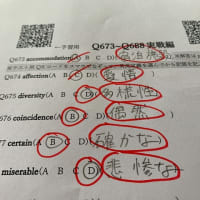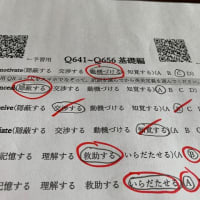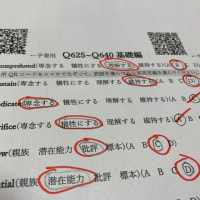長らくブログの更新がなく申訳ありませんでした。さて、四月はジオス倒産という衝撃が走りました。三年前のNOVAとは違ってスキャンダル絡みの報道はないものの、大手英会話スクールの連続倒産は日本の英語教育に警鐘を鳴らす事態と思われます。サービスに顧客が満足していれば次々と経営不振に陥るはずはありません。
端的に言えば英会話中心の英語学習では英語を効率的に習得できないということです。誤解を避けるために言っておきますと、英会話は重要な英語スキルであって、どの英会話スクールも会話偏重で英語力がつかないというわけではありません。ただ、英会話はどうしてもアウトプット中心になり、インプットがおざなりになることが多いです。英会話でよく言われる「間違いを恐れない勇気」だけではなく、折り目正しい英語のインプットを通して「間違いを減らす努力」が英語上達には不可欠です。
そこで、著作権の切れた童話「ドリトル先生航海記」から、シンプルで、大学入試にもTOEICにも英検にも有効な練習問題を作成してみました。楽しみながら英語力を伸ばしていただければ幸いです。リーディングは安くて確実な英語学習法です。
さんざんな結果に終わった文科省の「会話重視の英語教育」に続いて導入が予定されている「英語による高校英語授業」はまず間違いなく失敗に終わるでしょう。英検準1級取得を督励されている高校英語教員が少なくない現状で基礎力を欠いた生徒に英語で授業を行ってもうまくいくはずはなく、「会話重視の英語教育」の焼き直しに終わるのが関の山です。不正確な英会話に時間をかけるよりは、童話のような会話の多い英文に親しむ方が英会話も上達が早くなります。
コロンで区切られているのが四語選択問題、スラッシュで区切られているのが四語整序問題です。
四語選択問題の単語は大学入試、英検、TOEICに共通する重要単語で*印は問題の難易度の目安です。*印が多いほど難しい単語になっています。無印は語法・文法等の問題です。
わからない単語が四語選択問題の中にあれば辞書で調べて、どの単語が文脈に合うか考えるだけでも英語力がつきます。英英辞典を使えれば効果倍増です。
ネイティブの発想でわかりやすく書かれた英英辞典は英語の万能細胞と言っても過言ではありません。
英英辞典が使えるかどうかは
英英実力判定テストでお調べください。使いにくければ
english x englishをお試しください。英英辞典を使うのが楽になります。
基礎単語と英文法を一通り学んだ後には英文和訳や和文英訳のような日本語にしばられた英語学習は避けて、実力相応の英文の読書および、長文中の四語選択問題と四語整序問題に取り組む方が効率的に英語力を伸ばせます。単熟語の意味と文の構造および文脈がわかれば一般的な英文は理解できるようになり、大量のインプットがあればアウトプット訓練も楽になります。
著作権の関係でお示しすることはできないとはいえ、英検1級レベルの長文(TIME,NEWSWEEKのやさしめの記事程度)から作成した四語選択問題と四語整序問題がすらすら解けるようになれば英検1級・TOEIC900点レベル到達は十分可能です。
※(13)の解答①(with their eyes shut)②(swinging her head from)③(as though it were)④(although)⑤(hardly)⑥(as not to wake)⑦(into)⑧(suppose)⑨(working in his study)⑩(made my way to)⑪(certainly)⑫(while)⑬(find that he has)⑭(different families of fishes)⑮(of life he leads)⑯(presume)⑰(to be found in)⑱(poured)⑲(manage)⑳(that people have never)
(14)
"But men do go down, don't they?" I asked—"divers and people like that?"
"Oh yes, to be sure," said the Doctor. "Divers go down. I've been down myself in a diving-suit, for that matter. But my!—they only go where the sea is ①**(ethnic : shallow : timid : mature). Divers can't go down where it is really deep. ②(When : What : Which : Where) I would like to do is to go down to the great depths—where it is miles deep—Well, well, I dare say I shall manage it some day. Let ③(another / me / you / give) cup of tea."
THE EIGHTH CHAPTER. ARE YOU A GOOD NOTICER?
JUST at that moment Polynesia came into the room and said something to the Doctor in bird language. Of course I did not ④(what / understand / was / it). But the Doctor at once put down his knife and fork and left the room.
"You know it is an awful shame," said the parrot as soon as the Doctor had closed the door. "Directly he comes back home, all the animals over the whole countryside get ⑤(of / to / it / hear) and every sick cat and mangy rabbit for miles around comes to see him and ask his advice. Now there's a big fat hare outside at the back door with a squawking baby. Can she see the Doctor, please!—Thinks it's going to have convulsions. Stupid little thing's been eating Deadly Nightshade again, I suppose. The animals are SO inconsiderate at times—especially the mothers. They come round and call the Doctor away from his meals and wake him out of his bed at all hours of the night. I don't know how he ⑥(makes : stands : leaves : sits) it—really I don't. Why, the poor man never gets any peace at all! I've told him time and again to have special hours for the animals to come. But he is so frightfully kind and ⑦**(disabled : hostile : radical : considerate). He never refuses to see them ⑧(whether : why : if : what) there is anything really wrong with them. He says the ⑨*(urgent : common : brief : material) cases must be seen at once."
"Why don't some of the animals go and see the other doctors?" I asked.
"Oh Good Gracious!" exclaimed the parrot, tossing her head scornfully. "Why, there aren't any other animal-doctors—not real doctors. Oh of course there ARE those vet persons, to be sure. But, bless you, they're no good. You see, they can't understand the animals' language; so how can you ⑩(them / expect / be / to ) any use? Imagine yourself, or your father, going to see a doctor who could not understand a word you say—nor even tell you in your own language what you must do to get well! Poof!—those vets! They're that stupid, you've no idea!—Put the Doctor's bacon down by the fire, will you?—to keep hot ⑪(by : from : to : till) he comes back."
"Do you think I would ever be able to learn the language of the animals?" I asked, laying the plate upon the hearth.
"Well, it all ⑫*(relates : depends : grants : translates)," said Polynesia. "Are you clever at lessons?"
"I don't know," I answered, feeling rather ashamed. "You see, I've never been to school. My father is too poor to send me."
"Well," said the parrot, "I don't suppose you have really missed much—to judge from what I have seen of school-boys. But listen: are you a good noticer?—Do you notice things well? I mean, for instance, supposing you saw two cock-starlings on an apple-tree, and you only took one ⑬(them / at / look / good)—would you be able to tell one from the other if you saw them again the next day?"
"I don't know," I said. "I've never tried."
"Well that," said Polynesia, brushing some crumbs off the corner of the table with her left foot—"that is what you call powers of ⑭*(luxury : observation : construction : necessity)—noticing the small things about birds and animals: the way they walk and move their heads and flip their wings; the way they sniff the air and twitch their whiskers and wiggle their tails. You have to notice all those little things if you want to learn animal language. For you see, lots of the animals hardly talk at all with their tongues; they use their breath or their tails or their feet instead. That is ⑮(why : how : where : because) many of them, in the olden days when lions and tigers were more plentiful, were afraid to make a noise for fear the ⑯**(diligent : savage : elaborate : solar) creatures heard them. Birds, of course, didn't care; ⑰(from : what : for : why) they always had wings to fly away with. But that is the first thing to remember: being a good noticer is terribly important ⑱(from : by : of : in) learning animal language."
"It sounds pretty hard," I said.
"You'll have to be very patient," said Polynesia. "It takes a long time to say even a few words ⑲*(specifically : properly : sincerely : awfully). But if you come here often I'll give you a few lessons myself. And once you get started you'll be surprised how fast you get on. It would indeed be a good thing if you could learn. Because then you could do some of the work for the Doctor—I mean the easier work, like bandaging and giving pills. Yes, yes, that's a good idea of mine. 'Twould be a great thing if the poor man could get some help—and some rest. It is a scandal the way he works. I see no reason ⑳(because : why : when : but) you shouldn't be able to help him a great deal—That is, if you are really interested in animals."
※⑳の少し前のthe poor manとは誰かおわかりですか?
解答は次回発表。ご意見、ご要望等はsuzuyasu@wmail.plala.or.jpでも承っております。
端的に言えば英会話中心の英語学習では英語を効率的に習得できないということです。誤解を避けるために言っておきますと、英会話は重要な英語スキルであって、どの英会話スクールも会話偏重で英語力がつかないというわけではありません。ただ、英会話はどうしてもアウトプット中心になり、インプットがおざなりになることが多いです。英会話でよく言われる「間違いを恐れない勇気」だけではなく、折り目正しい英語のインプットを通して「間違いを減らす努力」が英語上達には不可欠です。
そこで、著作権の切れた童話「ドリトル先生航海記」から、シンプルで、大学入試にもTOEICにも英検にも有効な練習問題を作成してみました。楽しみながら英語力を伸ばしていただければ幸いです。リーディングは安くて確実な英語学習法です。
さんざんな結果に終わった文科省の「会話重視の英語教育」に続いて導入が予定されている「英語による高校英語授業」はまず間違いなく失敗に終わるでしょう。英検準1級取得を督励されている高校英語教員が少なくない現状で基礎力を欠いた生徒に英語で授業を行ってもうまくいくはずはなく、「会話重視の英語教育」の焼き直しに終わるのが関の山です。不正確な英会話に時間をかけるよりは、童話のような会話の多い英文に親しむ方が英会話も上達が早くなります。
コロンで区切られているのが四語選択問題、スラッシュで区切られているのが四語整序問題です。
四語選択問題の単語は大学入試、英検、TOEICに共通する重要単語で*印は問題の難易度の目安です。*印が多いほど難しい単語になっています。無印は語法・文法等の問題です。
わからない単語が四語選択問題の中にあれば辞書で調べて、どの単語が文脈に合うか考えるだけでも英語力がつきます。英英辞典を使えれば効果倍増です。
ネイティブの発想でわかりやすく書かれた英英辞典は英語の万能細胞と言っても過言ではありません。
英英辞典が使えるかどうかは
英英実力判定テストでお調べください。使いにくければ
english x englishをお試しください。英英辞典を使うのが楽になります。
基礎単語と英文法を一通り学んだ後には英文和訳や和文英訳のような日本語にしばられた英語学習は避けて、実力相応の英文の読書および、長文中の四語選択問題と四語整序問題に取り組む方が効率的に英語力を伸ばせます。単熟語の意味と文の構造および文脈がわかれば一般的な英文は理解できるようになり、大量のインプットがあればアウトプット訓練も楽になります。
著作権の関係でお示しすることはできないとはいえ、英検1級レベルの長文(TIME,NEWSWEEKのやさしめの記事程度)から作成した四語選択問題と四語整序問題がすらすら解けるようになれば英検1級・TOEIC900点レベル到達は十分可能です。
※(13)の解答①(with their eyes shut)②(swinging her head from)③(as though it were)④(although)⑤(hardly)⑥(as not to wake)⑦(into)⑧(suppose)⑨(working in his study)⑩(made my way to)⑪(certainly)⑫(while)⑬(find that he has)⑭(different families of fishes)⑮(of life he leads)⑯(presume)⑰(to be found in)⑱(poured)⑲(manage)⑳(that people have never)
(14)
"But men do go down, don't they?" I asked—"divers and people like that?"
"Oh yes, to be sure," said the Doctor. "Divers go down. I've been down myself in a diving-suit, for that matter. But my!—they only go where the sea is ①**(ethnic : shallow : timid : mature). Divers can't go down where it is really deep. ②(When : What : Which : Where) I would like to do is to go down to the great depths—where it is miles deep—Well, well, I dare say I shall manage it some day. Let ③(another / me / you / give) cup of tea."
THE EIGHTH CHAPTER. ARE YOU A GOOD NOTICER?
JUST at that moment Polynesia came into the room and said something to the Doctor in bird language. Of course I did not ④(what / understand / was / it). But the Doctor at once put down his knife and fork and left the room.
"You know it is an awful shame," said the parrot as soon as the Doctor had closed the door. "Directly he comes back home, all the animals over the whole countryside get ⑤(of / to / it / hear) and every sick cat and mangy rabbit for miles around comes to see him and ask his advice. Now there's a big fat hare outside at the back door with a squawking baby. Can she see the Doctor, please!—Thinks it's going to have convulsions. Stupid little thing's been eating Deadly Nightshade again, I suppose. The animals are SO inconsiderate at times—especially the mothers. They come round and call the Doctor away from his meals and wake him out of his bed at all hours of the night. I don't know how he ⑥(makes : stands : leaves : sits) it—really I don't. Why, the poor man never gets any peace at all! I've told him time and again to have special hours for the animals to come. But he is so frightfully kind and ⑦**(disabled : hostile : radical : considerate). He never refuses to see them ⑧(whether : why : if : what) there is anything really wrong with them. He says the ⑨*(urgent : common : brief : material) cases must be seen at once."
"Why don't some of the animals go and see the other doctors?" I asked.
"Oh Good Gracious!" exclaimed the parrot, tossing her head scornfully. "Why, there aren't any other animal-doctors—not real doctors. Oh of course there ARE those vet persons, to be sure. But, bless you, they're no good. You see, they can't understand the animals' language; so how can you ⑩(them / expect / be / to ) any use? Imagine yourself, or your father, going to see a doctor who could not understand a word you say—nor even tell you in your own language what you must do to get well! Poof!—those vets! They're that stupid, you've no idea!—Put the Doctor's bacon down by the fire, will you?—to keep hot ⑪(by : from : to : till) he comes back."
"Do you think I would ever be able to learn the language of the animals?" I asked, laying the plate upon the hearth.
"Well, it all ⑫*(relates : depends : grants : translates)," said Polynesia. "Are you clever at lessons?"
"I don't know," I answered, feeling rather ashamed. "You see, I've never been to school. My father is too poor to send me."
"Well," said the parrot, "I don't suppose you have really missed much—to judge from what I have seen of school-boys. But listen: are you a good noticer?—Do you notice things well? I mean, for instance, supposing you saw two cock-starlings on an apple-tree, and you only took one ⑬(them / at / look / good)—would you be able to tell one from the other if you saw them again the next day?"
"I don't know," I said. "I've never tried."
"Well that," said Polynesia, brushing some crumbs off the corner of the table with her left foot—"that is what you call powers of ⑭*(luxury : observation : construction : necessity)—noticing the small things about birds and animals: the way they walk and move their heads and flip their wings; the way they sniff the air and twitch their whiskers and wiggle their tails. You have to notice all those little things if you want to learn animal language. For you see, lots of the animals hardly talk at all with their tongues; they use their breath or their tails or their feet instead. That is ⑮(why : how : where : because) many of them, in the olden days when lions and tigers were more plentiful, were afraid to make a noise for fear the ⑯**(diligent : savage : elaborate : solar) creatures heard them. Birds, of course, didn't care; ⑰(from : what : for : why) they always had wings to fly away with. But that is the first thing to remember: being a good noticer is terribly important ⑱(from : by : of : in) learning animal language."
"It sounds pretty hard," I said.
"You'll have to be very patient," said Polynesia. "It takes a long time to say even a few words ⑲*(specifically : properly : sincerely : awfully). But if you come here often I'll give you a few lessons myself. And once you get started you'll be surprised how fast you get on. It would indeed be a good thing if you could learn. Because then you could do some of the work for the Doctor—I mean the easier work, like bandaging and giving pills. Yes, yes, that's a good idea of mine. 'Twould be a great thing if the poor man could get some help—and some rest. It is a scandal the way he works. I see no reason ⑳(because : why : when : but) you shouldn't be able to help him a great deal—That is, if you are really interested in animals."
※⑳の少し前のthe poor manとは誰かおわかりですか?
解答は次回発表。ご意見、ご要望等はsuzuyasu@wmail.plala.or.jpでも承っております。






















※コメント投稿者のブログIDはブログ作成者のみに通知されます